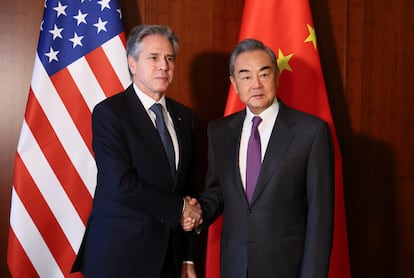Navalny’s death deepens tension between democracies and authoritarian regimes
The Munich Security Conference has highlighted the broken global order in which Russia, China, Iran and North Korea are closing ranks. ‘The question is whether democracy will survive,’ says the president of the European Commission


The news on Friday of Alexei Navalny’s death struck like an ominous lightning bolt in the rooms of the Bayerischer Hof hotel, the traditional venue of the Munich Security Conference, just as the forum was about to begin. Since then, many have thought about what Ukrainian President Volodymyr Zelenskiy said the next day: “[Russian President Vladimir Putin] tried to send us all a clear message.” This was a message of total confrontation with the West — Western leaders had demanded that Navalny’s physical integrity be respected — and of total disregard for democracy.
In this confrontation, Putin is not alone. Iran supplies Russia with drones. North Korea, ammunition. China does not provide weapons, as far as is known, but it does give Russian with an economic lifeline through trade, including technological products essential for the Russian war economy; and a political lifeline, through multiple top-level meetings and joint declarations that call for a new world order and claim that democracy and human rights are relative concepts. Ukraine has accused Beijing of helping Moscow with its cyberattacks against the country.
And the confrontation in question, of course, is not just about Ukraine. The president of the European Commission, Ursula von der Leyen, made this clear in her speech on Saturday at the Munich Security Conference. “It’s not just about Ukraine but about sending a signal to others. The question is whether democracy will survive in the world and whether we can defend our values, and the answer has to be yes,” she told the conference, which brings together hundreds of political and military leaders from around the world in the Bavarian capital every year.
“This is Russia’s war against any rules at all,” said Zelenskiy. “May our world based on rules never become the world of yesterday,” he added, with a sad reference to Stefan Zweig’s memoirs.
What is clear is that the entire world is watching to see what outcome Putin’s invasion will have, to see what resistance will be put up by the 50 democracies that support Ukraine — the response that Von der Leyen spoke of on Saturday. Everyone will draw conclusions, and they will, of course, be greatly influenced by whether or not Donald Trump — the front-runner in the Republican primary — wins the November presidential elections in the United States.
Tension beyond Ukraine
Putin himself has clearly said that the fight is not just about Ukraine. “This is not a territorial conflict and not an attempt to establish regional geopolitical balance. The issue is much broader and more fundamental and is about the principles underlying the new international order,” the Russian president said at the last Valdai forum.
Putin traveled to Munich in 2007 to issue the same warning: that he did not agree with the current world order and that he rejected the primacy of the United States. And he made it clear that he was willing to challenge this state of affairs. In the U.S., the Bush administration — which had illegally invaded Iraq — decided to move forward with opening NATO’s door to Ukraine and Georgia. But for countries Putin considered to be under Russia’s influence, the Russian president did not respect that they had the freedom to decide their own future. And in the fact of the West’s passivity, Putin used de facto means against Ukraine and Georgia. The situation escalated, until today’s full-scale invasion of Ukraine.
In the midst of Putin’s war, autocratic regimes have closed ranks, but this does not mean that they are a seamless unitary pole. Nor is the European pole, despite being more cohesive.
At the Munich Security Conference, Wang Yi, China’s main foreign policy representative, tried to present his country as a stabilizing force in times of turbulence. “The key message I would like to convey to you is that regardless of changes in the world, China as a responsible power will continue to adhere to its principles, pursue consistent and sustainable policy, acting as an unwavering force ensuring stability in this turbulent world,” Wang said. He added that it will achieve this by pushing for cooperation among major countries.
Beijing has a vested interest in ensuring that stability of a system that has allowed it to prosper. At the same time, on the back of its new prosperity, China has become more assertive under Xi Jinping’s long rule.
China’s warning
Beyond the reassuring message, Wang’s address revealed worrying cracks. “Whoever tries de-sinicization in the name of de-risking would be making a historical mistake,” he said emphatically. Both the U.S. and the EU are actively working to reduce their dependence on China.
When asked by Christoph Heusgen, the chairman of the Munich Security Conference, if it would not be a good idea for Beijing to increase pressure on Moscow to curb its invasion, Wang responded that there were “not ripe conditions in place for parties to go back to the negotiating table.” Meanwhile, bilateral trade between the China and Russia countries breaks records, exceeding $200 billion in 2023.
The strength of the relationship is clear. “Right now there are changes — the likes of which we haven’t seen for 100 years — and we are the ones driving these changes together,” Chinese President Xi Jinping told Putin last March as he said goodbye after a meeting, likely not realizing that the brief conversation was being recorded.
Amid the struggle between democracies and authoritarian regimes, the West is having a harder time recruiting new partners. The Munich Security Conference highlighted how the West’s position in the conflict in the Middle East is hurting its global image, as it comes under attack of having double standards.
U.S. Secretary of State Antony Blinken spoke of “the imperative, that’s more urgent than ever, to proceed to a Palestinian state that also ensures the security of Israel.” In recent weeks, Blinken has warned that Israel’s response to the Hamas attack is excessively hurting Palestinian civilians. But the world is well aware that the United States has done nothing in the past to help guarantee the creation of a Palestinian. And today, while it mourns the civilian deaths in Gaza, it continues to send arms to Israel. In a statement, the EU asked Israel not to proceed with the Rafah offensive in southern Gaza. But it has not reviewed the terms of its relations with Israel.
Of course, Putin’s offensive war — lacking any justification — is different to Israel’s war in response to the Hamas attack. But Western inaction in the face of decades of oppression, the illegal occupation and colonization of Palestinian land, and the brutality of the Israeli response, leaves it exposed to criticism of hypocrisy. The 2003 illegal invasion of Iraq doesn’t help its image either.
In the Global South, a large group of countries has refused to align themselves with the West. This group includes full-fledged democracies, fragile ones and authoritarian regimes. Many of these countries have been negatively affected by the conflict in the Northern Hemisphere, while seeking to take advantage of the competition between powers to secure better returns.
This competition, this confrontation, is underway. It does not have the same ideological component as the Cold War, but it is also a battle for power. Today the battle is between a group of authoritarian regimes that demand a more favorable world order and the democracies that have held a position of preeminence since World War II.
Navalny’s death is emblematic of this tension. It has widened the gap between the democratic world, which has mourned his death, and the countries that prefer to look the other way. China, incidentally, declined to comment, arguing that this was an “internal matter” for Russia.
Sign up for our weekly newsletter to get more English-language news coverage from EL PAÍS USA Edition
Tu suscripción se está usando en otro dispositivo
¿Quieres añadir otro usuario a tu suscripción?
Si continúas leyendo en este dispositivo, no se podrá leer en el otro.
FlechaTu suscripción se está usando en otro dispositivo y solo puedes acceder a EL PAÍS desde un dispositivo a la vez.
Si quieres compartir tu cuenta, cambia tu suscripción a la modalidad Premium, así podrás añadir otro usuario. Cada uno accederá con su propia cuenta de email, lo que os permitirá personalizar vuestra experiencia en EL PAÍS.
¿Tienes una suscripción de empresa? Accede aquí para contratar más cuentas.
En el caso de no saber quién está usando tu cuenta, te recomendamos cambiar tu contraseña aquí.
Si decides continuar compartiendo tu cuenta, este mensaje se mostrará en tu dispositivo y en el de la otra persona que está usando tu cuenta de forma indefinida, afectando a tu experiencia de lectura. Puedes consultar aquí los términos y condiciones de la suscripción digital.








































